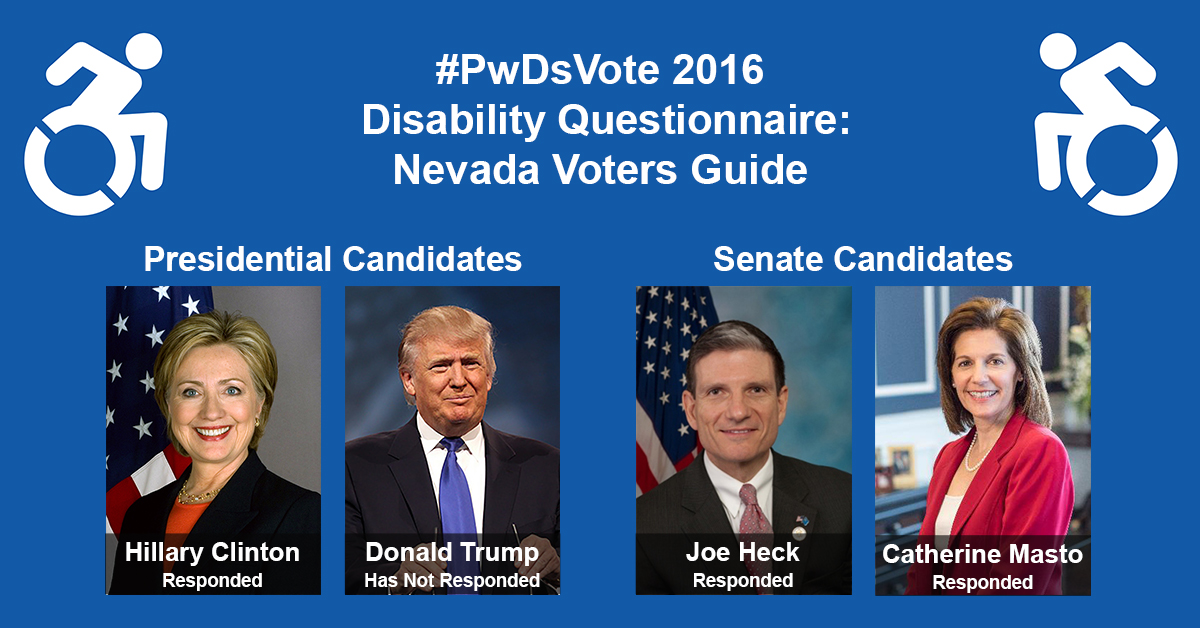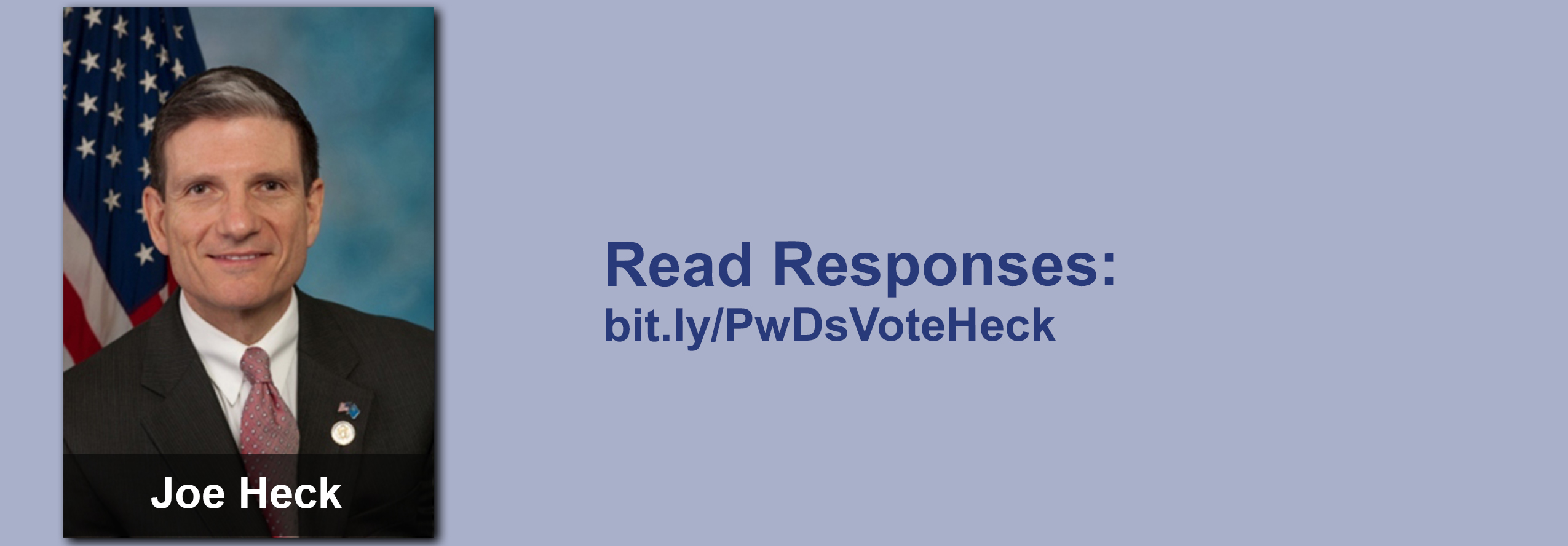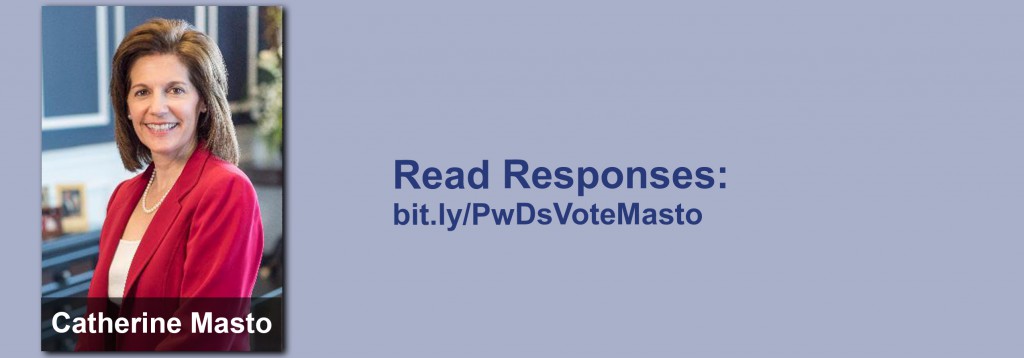Washington, Oct. 11 – Following responses from Democrat Catherine Cortez Masto and Republican Joe Heck, who are both seeking the open Senate seat in Nevada, RespectAbility is releasing its Nevada Disability Voter guide for the upcoming presidential and senate elections. Both Heck and Masto, as well as presidential candidate Hillary Clinton, have completed the #PwDsVote Disability Campaign Questionnaire for people with disabilities and have very different solutions to pressing problems. By both Senate candidates filling out the questionnaire, each of them communicates to residents of the Silver State that disability issues matter to them.
The #PwDsVote 2016 Campaign Questionnaires were designed by and for people with disabilities (PwDs) and those who love them to know where candidates stand on key issues. RespectAbility is nonpartisan and does not endorse candidates. The questionnaires are purely for educational purposes as voters go to the polls.
According to a new report from Rutgers University, 35.4 million people with disabilities will be eligible to vote in the November 2016 elections, representing close to one-sixth of the total electorate. That’s an increase of nearly 11 percent since 2008.
The presidential questionnaire was created during the primary season and asked all of the presidential candidates to comment on 16 disability questions. Former Secretary of State Hillary Clinton responded by addressing all of the questions. Despite numerous requests in person and by phone and email, the Trump campaign has not yet filled out the questionnaire. The American Association of People with Disabilities and the National Council on Independent Living also has a nonpartisan presidential questionnaire, which both Clinton and Trump have completed. Libertarian Gary Johnson and Green Party candidate Jill Stein have not filled out either questionnaire.
The down-ballot survey was adapted from the presidential questionnaire to ask gubernatorial candidates 16 questions and senatorial candidates 17 questions. All answers are posted verbatim and in full on The RespectAbility Report, a publication that covers the intersection of disability and politics.
Nevada has an open Senate race and both major-party candidates have responded, allowing the 357,035 citizens with disabilities a chance to read their responses and compare them on a variety of issues.
Nevada is a leader in disability employment, as the gap between the employment of people with and without disabilities currently stands at 33.4 percent, the second lowest in the nation only behind North Dakota. However, there is still much work to be done to improve outcomes for people with disabilities. Nevada’s state plan for the Workforce Innovation and Opportunity Act (WIOA) continues to outline innovative programs that will increase opportunities and employment for people with disabilities.
Rep. Joe Heck, who has worked with organizations such as Easter Seals Nevada, spoke out about the need to reduce stigma and get more people with disabilities employed.
“I’ve seen firsthand that individuals with disabilities can do jobs just as well, if not better than, those without disabilities,” he responded in the questionnaire. “That is a message that all of us have a responsibility to disseminate to the broader community through words and actions. The best way we can do that is to ensure they can access the same job and educational opportunities as their non-disabled peers.”
Former Atty. Gen. Catherine Masto emphasized the need to reduce stigma due to the damage it causes to individuals.
“Too often people with disabilities carry these prejudices when applying for employment or housing,” she responded. “I have always fought for workers’ rights, and fair and equal employment opportunities – and fighting for fair and equitable treatment for people with disabilities is no exception. I support legislation that would prohibit employers from paying workers with disabilities less than their counterparts, and I oppose legislation that discriminates against applicants.”
Fully one-out-of-five voters have a disability, and 52 percent of likely voters have a loved one with a disability. Only 34 percent of working-age Americans with disabilities have jobs, despite the fact that the vast majority want to work. More than 11 million working age people with disabilities are now living on government benefits in our country.
RespectAbility President Jennifer Laszlo Mizrahi said, “Our community is looking for jobs so we can achieve the American dream, just like anyone else. It is vital for us to know where the candidates stand economic, stigma, education, safety, transportation, housing, healthcare, foreign affairs and other issues. The candidates have hugely different ideas about how to deal with the issues. Thus, it’s extremely important to read their full answers so you can understand their vast differences.”
Nevada Continues to Demonstrate a Commitment to People with Disabilities
There are 201,717 Nevadans with disabilities who are between the ages of 18-64. Additionally, there are 8,200 Nevadans ages 16-20 with disabilities. More than 42,000 Nevada students have individual education plans (IEPs). However, many Nevadans with disabilities have not yet received a disability diagnosis they need, and thus are not yet receiving the school accommodations and supports that they need to succeed. Many students who might need support to succeed academically instead find themselves trapped into a lifetime of poverty or flowing down the school to prison pipeline.
Today Nevada has the opportunity to work hard to improve outcomes in terms of competitive, integrated employment for people with disabilities. Currently 40.9 percent of working-age Nevadans with disabilities are employed compared to 74 percent of those without disabilities. View the rankings of all 50 states and compare.
Nevada is ahead of many states in terms of expanding employment for people with disabilities. According to the most recent, publicly available Census data, Nevada ranks 10th in the nation as measured by the employment rate of people with disabilities. Another measure of the significant strides that the Silver State has been making is the decreasing gap in the employment rates between people with and without disabilities. Nevada has the second smallest employment gap amounting to only 33.4 percentage points and is only surpassed by North Dakota.
RespectAbility, founded in 2013, is a nonpartisan, nonprofit organization working to end stigmas and advance opportunities for people with disabilities. It has submitted comments for all 50 state’s drafts of the Unified Plan as required under Section 102 of WIOA. Nevada’s commitment to people with disabilities is evident throughout the written state plan. The plan as written will significantly improve Nevada’s workforce system and its ability to serve people with barriers to employment. This draft plan will capitalize on the partnerships and collaborations necessary to empower youth transitioning from school to work and to solve challenges created by limited resources.
One of the most important facets of WIOA is that it raises expectations for youth with disabilities and assists states to provide them with the supports they need to ensure success. Indeed, as Nevada’s Baby Boomers retire and the state’s economy evolves, employers are starting to experience increasing talent shortage. Nevadans with disabilities are an untapped resource that can be trained to bridge that gap. A recent detailed study by the Kessler Foundation and the University of New Hampshire shows the 70 percent of working age people with disabilities are striving for work.
Evidence shows that people with disabilities can provide a wonderful solution to companies and other employers that want to succeed. The diverse skills, greater loyalty and higher retention rates of people with disabilities are already starting to meet employer talent needs in increasing numbers around America. With WIOA, Nevada can benefit from that progress if it truly breaks down silos within government agencies and partners, and lets innovation, based on evidence-based practices, take place.
However, the gap in the labor force participation between people with and without disabilities is still too large around the entire country. This lack of employment for people with disabilities creates poverty, powerlessness, and poor health. Polls and studies show that people with disabilities want the opportunity to have the dignity and independence that jobs provide.
America has 1.2 million youth with disabilities, between the ages of 16 and 20. Each year 300,000 of them age into what should be the workforce, but stigmas and lack of knowledge about the capabilities of people with disabilities means that most do not find employers willing to hire them. Young adults with disabilities in all of these states are hoping to find work. They have high expectations and deserve the opportunity to achieve the American dream. Young people with disabilities may simply need some thoughtful help to transition into the workforce. See data on all 50 states here: State Data.
Remember to Vote
Nevada residents can vote for the candidates of their choice either on the standard voting schedule or through early voting. Nevadans have until October 18, 2016, to register to vote for the presidential general election. You can register to vote online at: Online Voter Registration. Voters also can cast an early vote from Saturday, October 22, 2016 through Friday, November 4, 2016. More information regarding early voting in Nevada can be found at: Early Voting Information. If you are unable to partake in early or standard voting, any registered Nevada voter can submit a vote through absentee ballots as well. To request an absent ballot, you must complete and submit an Absent Ballot Request Form to the County Clerk/Registrar of Voters in the county where you are registered to vote. More information and assistance regarding absentee ballots can be found at: Absentee Voting.







Be First to Comment